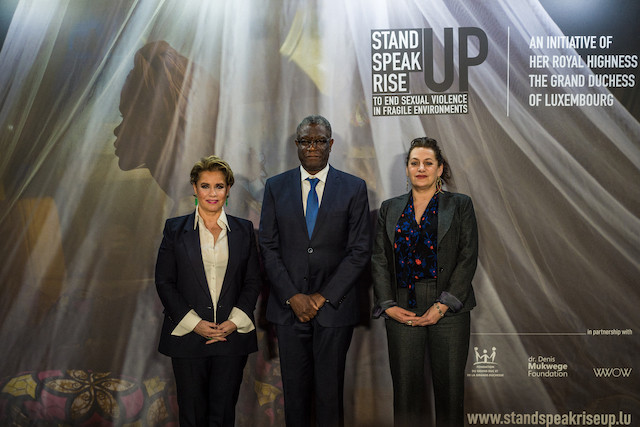2018 Nobel Peace Prize winners Dr Denis Mukwege and Nadia Murad will be in Luxembourg on 26-27 March at the invitation of Grand Duchess Maria Teresa. They are among the guest speakers at the Stand, Speak, Rise Up forum that the Grand Duchess has organised to address the damage, isolation and stigma experienced by survivors of sexual violence in fragile environments.
Mukwege is a world-renowned gynaecological surgeon as well as the founder and medical director of Panzi Hospital in Bukavu, Democratic Republic of the Congo. He is recognised as the world's leading expert on “repairing” the internal physical damage caused by rape. Together with his team, he treated more than 50,000 victims in east Congo. In 2018 he received the Nobel Peace Prize, together with Yazidi activist and rape survivor Nadia Murad, for his efforts to end the use of sexual violence as a weapon of war and in armed conflict.
Other speakers at the forum include Muhammad Yunus, another Nobel Peace Prize winner whom the Grand Duchess has known for several years in her capacity as a UNESCO goodwill ambassador--they were reunited in Luxembourg in 2012, when he attended the European Microfinance Award, of which she is patron.
Also on the programme are Luxembourg prime minister Xavier Bettel and foreign minister Jean Asselborn--the forum has received solid supports from the Luxembourg government. The Grand Duchess has also invited international lawyer and founder of We Are Not Weapons of War, Céline Bardet. Specialising in war crimes, international crime, post conflict justice, security and in investigation techniques and criminal prosecution, Bardet founded her organisation after witnessing the horror of sexual violence used en masse in many countries and the lack of prosecution surrounding it.
Humanitarian engagement
The Grand Duchess has long been a champion of women’s and children’s rights and has committed to social and humanitarian issues. Where did this stem from? “When I was a young girl of around 12 I started reading a lot about social engagement. Little by little it became evident that it was what I wanted to do later on,” she says. When deciding what to study at university, she chose political sciences over law. “I thought it would give me a wider view of the geo-political situation of the world, so that maybe I would have more tools to defend those who cannot defend themselves--it was humanitarian and nothing to do with politics. So, when I married my husband [prince, now Grand Duke Henri] I was in the privileged position of being able to do just that, what I love most.”
The conference will address the geopolitical factors that lead to conflicts and also seek to understand the root causes of sexual violence in fragile environments. Education could be a key, the Grand Duchess agrees. “Culturally in the home as well as institutionally, we need to start with teaching little boys.”

“I hope the forum serves as an eye-opener,” the Grand Duchess said. Photo: Mike Zenari
Acknowledging the extent of the problem and the fact that it has only recently started to be addressed, the Grand Duchess talks about her hopes for her initiative. “I hope the forum serves as an eye-opener,” she says. “This is a problem as old as history, it started already with the Greeks and Romans. But the scale is now worldwide, and that is what is frightening. We are not only talking about war, we are talking about situations where there are guerrillas, situations in refugee camps.”
Giving survivors a voice
The Grand Duchess says the biggest help activists trying to push the problem into the public eye could have had was the awarding of the Nobel Peace Prize last year.
“I think it was incredible, marvelous, that Dr Mukwege and Nadia Murad were awarded the Nobel Peace Prize. It helped to bring focus on the subject, and I was very moved. The topic was triggered about 4 or 5 years ago, and I hope that my forum is only one little milestone in many different work groups and forums and concrete actions.”
Placing survivors at the heart of the conference was very important to the Grand Duchess and the event partners. Last November, addressing the Women’s Forum for The Economy & Society, the Grand Duchess spoke about her hopes for the Stand Speak Rise Up! initiative. “We need to move from emotion to action,” she said. “I am convinced that by putting survivors at the heart of the debate, they can become actresses of change!”
She has personally met many of the survivors at events in The Hague and Geneva with Dr Mukwege. “I have tremendous respect and enormous affection for them. There is now a link that I cannot ignore, that engages me. And I am happy to be engaged in a topic that needs such attention and visibility. In the position that I am in, if I can help I’ll do as much as I can. I will continue to work with Dr Mukwege and Céline Bardet and the survivors. This forum is only the beginning of an ongoing action and accompaniment.”
